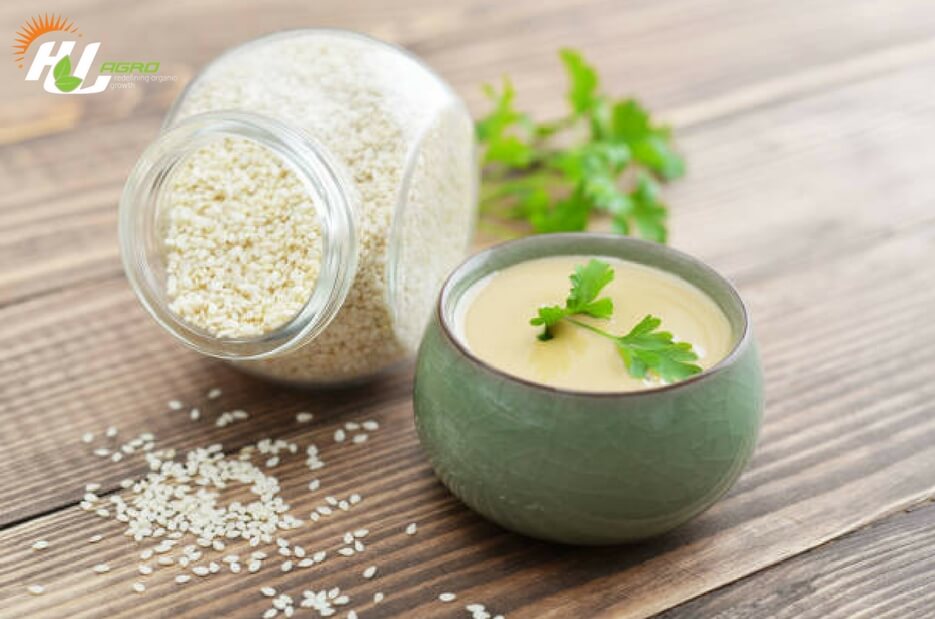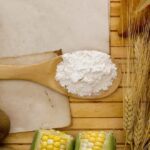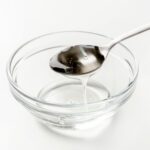Tahini, a protein-rich paste made from hulled, ground, and toasted sesame seeds add a heavyweight presence to any dish. It is commonly used in North African, Greek, Iranian, Turkish, and Middle Eastern cuisine. A major ingredient in hummus and baba ghanoush, tahini dip holds a robust sesame flavor & a unique roasted aroma that makes it an ideal base for marinades.
Fast Facts about Tahini:
Tahini contains more protein than milk and most nuts. It’s a rich source of B vitamins that boost energy and brain function, vitamin E, which is protective against heart disease and stroke, and important minerals, such as magnesium, iron, and calcium.
Tahini is a paste or butter made from ground sesame seeds.
It is a key ingredient in hummus and in baba ghanoush, an aubergine dip.
It provides good amounts of protein and various minerals.
High in calories, it should always be eaten in moderation.

Nutrition:
Most people prefer the paler type, made from hulled (skinned) seeds. The darker sort, made from unhulled sesame, is stronger-tasting and slightly bitter, but arguably healthier because many of the nutrients are in the husk. An alternative view is that the fiber in the husk impairs mineral absorption. Either way, tahini is nutrient dense.
According to the United States Department of Agriculture (USDA) National Nutrient Database, a 2-tablespoon (tbsp) serving of tahini made from roasted sesame seeds and weighing 30 grams (g) contains:
- 178 Calorie
- 13 g of Fat
- 36 g of Carbohydrates
- 8 g of Fiber
- 15 g of Sugar
- 1 g of Protein
That same 2-tbsp serving provides:
- 8 percent of magnesium
- 22 percent of phosphorus
- 14 percent of iron
- 12 percent of calcium
Tahini seems to contain large amounts of fat. However, only 2 of the 16 g found in a 2-tbsp serving are saturated. The rest are mono- and poly-unsaturated fats, known to be beneficial to the heart and overall health.
Phytosterols, known for their cholesterol-lowering and cancer-blocking effects, are densely loaded in sesame seeds as compared to the other nuts and seeds.
There are many other nutrients in sesame seeds, but it is difficult for the body to absorb them due to their hard outer layer, or hull. Consuming sesame seeds in the paste form allows the body to absorb the nutrients they provide more efficiently.
Benefits: Tahini boasts a range of health benefits to enrich any meal.
1.) Heart health:
Being made from sesame seeds means that tahini can provide some of the benefits of sesamin and sesamol. These are lignans, antioxidant nutrients that can help support the immune system and balance hormone levels. Being high in monounsaturated and polyunsaturated fats, it can lower harmful cholesterol levels as well as lower the risk of heart disease and stroke. The calcium and magnesium content in this nourishing dip may also work to decrease blood pressure naturally.
2.) Cancer Prevention:
Lignans have a similar structure to estrogen. The sesamin and sesamol lignans in tahini can bind to estrogen receptors, which may protect against hormone-related cancers.
3.) Arthritis:
Tahini is a good source of magnesium which makes it a great product for headaches and muscular pains. The great thing about this nourishing spread is that it provides benefits well beyond pain relief. With a high alkaline mineral content of copper, this sesame paste helps in relieving pain and swelling associated with rheumatoid arthritis and other inflammatory diseases.
4.) Bone Health:
The high magnesium content in tahini is beneficial for maintaining healthy bones. Adequate magnesium intakes are associated with a greater bone density and have been effective in decreasing the risk of osteoporosis in postmenopausal women.
As per a recent study, magnesium holds the prowess of fortifying the bone mineral density in the neck & hip areas of the body.
5.) Diet:
Tahini is a major component of classic hummus, a popular dip based on chickpeas. With the addition of traditional hummus to the regular meals, you can relish the taste of tahini and also gain benefits from its sesame seed content.
Here are some quick tips for adding tahini to your diet:
- Top salads with a quick dollop of tahini.
- Try a creative spin on the classic hummus.
- Make your own salad dressing using the very flavorsome sesame seeds butter
- Dress up roasted or grilled veggies with a nutty tahini-based sauce.
- Traditionally dress the Mediterranean wraps – falafel & shawarma with a drizzle of this nutty sesame paste.
- Pair it with chocolates in cupcakes.






